"Donna Lee" is a bebop jazz standard attributed to Charlie Parker, although Miles Davis has also claimed authorship. Written in A-flat, it is based on the chord changes of the jazz standard "(Back Home Again in) Indiana". Beginning with an unusual half-bar rest, "Donna Lee" is a very complex, fast-moving chart with a compositional style based on four-note groups over each change.

Blue Haze is a compilation album of tracks recorded in 1953 and 1954 by Miles Davis for Prestige Records.
"Yardbird Suite" is a bebop standard composed by jazz saxophonist Charlie Parker in 1946. The title combines Parker's nickname "Yardbird" and a colloquial use of the classical music term "suite". The composition uses an 32-bar AABA form. The "graceful, hip melody, became something of an anthem for beboppers."
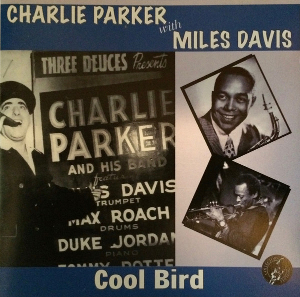
Cool Bird is a compilation album released by Magnum Collectors of recording sessions undertaken during October–December 1947 by Charlie Parker's 'classic quintet' for the Dial label featuring Parker, Miles Davis, Duke Jordan, Tommy Potter and Max Roach. They are joined by J. J. Johnson on six of the 22 tracks.
"Ko-Ko" is a 1945 bebop recording composed by Charlie Parker. The original recorded version lists Parker on alto saxophone with trumpeter Miles Davis, double bassist Curley Russell and drummer Max Roach. Due to the absence of Bud Powell, Dizzy Gillespie was enlisted to play piano, instead of his usual trumpet. Pianist Sadik Hakim, then known as Argonne Thornton, was also known to be present at the session. Rumors persist to this day about precisely who played trumpet and piano on this piece; some claim it's young Miles Davis who plays trumpet and Gillespie comping at piano, on both takes; most claim Gillespie plays trumpet and, or instead of, piano; some claim Hakim is the pianist on all or part of one or both of the takes. However, Miles Davis confirms in his autobiography that he did not play trumpet on "Ko Ko":
"I remember Bird wanting me to play "Ko-Ko," a tune that was based on the changes of "Cherokee." Now Bird knew I was having trouble playing "Cherokee" back then. So when he said that that was the tune he wanted me to play, I just said no, I wasn't going to do it. That's why Dizzy's playing trumpet on "Ko-Ko," "Warmin' up a Riff," and "Meandering" on Charlie Parker’s Reboppers, because I wasn't going to get out there and embarrass myself. I didn't really think I was ready to play tunes at the tempo of "Cherokee" and I didn't make no bones about it."

Conception is a compilation album issued by Prestige Records in 1956 as PRLP 7013, featuring Miles Davis on a number of tracks. The album, compiled from earlier 10 inch LPs, or as 78rpm singles, also features musicians such as Lee Konitz, Sonny Rollins, Stan Getz, Gerry Mulligan, and Zoot Sims. The cover was designed by Bob Parent. In particular, the entirety of the 10"LP Lee Konitz: The New Sounds makes up all of side 1.
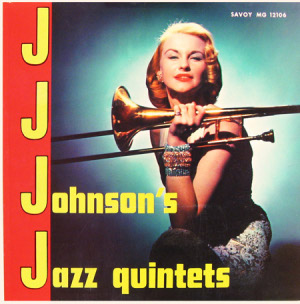
J. J. Johnson's Jazz Quintets is a studio album by jazz trombonist J. J. Johnson, released by Savoy Records, containing material from three different recording sessions in 1946, 1947 and 1949. Material from the first two sessions had been previously released on two Savoy EPs, New Trends In Jazz, Vol. 11 and Birth of Bop, Vol. 3. The album was re-issued on CD in 1992, and again in 1994 on the Savoy Jazz label.

Complete Charlie Parker on Dial is a 1996 box set release of jazz saxophonist and composer Charlie Parker's 1946–47 recordings for Dial Records. The box set, released by Jazz Classics, features 89 songs, including alternate takes and notes composed by jazz historian and Parker biographer Ira Gitler. John Genarri, author of the book Blowin' Hot and Cool: Jazz and Its Critics singles out the recording of "Lover Man" on this album, noting that "[t]his wrenching, anguished version...has been called Parker's most poetic statement on record" though, says Gennari, Parker himself viewed it as substandard and threatened physical violence against Ross Russell, a Dial records producer, for including it. Gennari also indicates that other tracks included on this CD—"Relaxin' at Camarillo", "Cheers", "Stupendous" and "Carvin' the Bird"—"have struck many listeners as his most joyous and optimistic."

Charlie Parker on Dial: The Complete Sessions is a 1993 four-disc box set collecting jazz saxophonist and composer Charlie Parker's 1940s recordings for Dial Records. The box set, released by the English label Spotlite Records, assembled into a single package the multi-volume compilation albums the label had released by Spotlite on vinyl in the 1970s under the series title Charlie Parker on Dial. The box set has been critically well received. In 1996, a different box set collecting Parker's work with Dial was assembled by Jazz Classics and released as Complete Charlie Parker on Dial.

Collectors' Items is a 1956 studio album by Miles Davis. There are two sessions collected on the album with largely different musicians. The first 1953 session is "Compulsion", "The Serpent's Tooth" and "'Round About Midnight". The second 1956 session is "In Your Own Sweet Way", "Vierd Blues" and "No Line". The personnel for the first session were Davis, Sonny Rollins and Charlie Parker on tenor sax, Walter Bishop on piano, Percy Heath on bass and Philly Joe Jones on drums. For the second session, the tenor sax was Rollins alone, the piano was Tommy Flanagan, the bass Paul Chambers and Art Taylor on drums.
"Billie's Bounce" is a jazz composition written in 1945 by Charlie Parker in the form of a 12 bar F blues. Some sources claim that the song was dedicated to Dizzy Gillespie's agent, Billy Shaw, although according to Ross Russell, Shaw's "name was misspelled" accidentally. However, others claim that the song was in fact dedicated to Shaw's secretary, who was called Billie. The original recording by Charlie Parker and His Re-Boppers was inducted into the Grammy Hall of Fame in 2002.
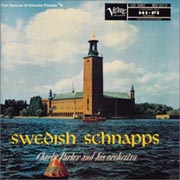
Swedish Schnapps(The Genius of Charlie Parker, volume 8) is a Charlie Parker studio album, released by Verve Records, compiling recordings made by two different groups, on two different dates in 1951. The tracks had previously been released as 78rpm singles, and the master takes had previously appeared on the 1955 Clef Records LP The Magnificent Charlie Parker.
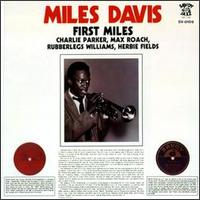
First Miles is a compilation album by American jazz musician Miles Davis, released on July 12, 1990 by Savoy Records. The album includes tracks from Davis's first recording session, backing singer Rubberlegs Williams on April 24, 1945, and the first session produced under his name, leading the members of Charlie Parker's band on August 14, 1947.

Modern Jazz Trumpets is an album released by Prestige Records in 1951 with music by four jazz trumpeters: Fats Navarro, Dizzy Gillespie, Miles Davis and Kenny Dorham. The album was released on the 10" LP format and includes the first recordings by Davis for Prestige.

The Charlie Parker Story is an LP record by Charlie Parker, released posthumously by Savoy Records. While many of the tracks on this album had been previously released on other formats, this is the first album that chronicles the entire session, recorded November 26, 1945, including all takes of all pieces. This session is famous in that it is the first recorded under Parker's name. It is also controversial, in that to this day it is unclear who the pianist and trumpet player are on all of the tracks.

The Immortal Charlie Parker is an LP record by Charlie Parker, released posthumously by Savoy Records. Several tracks on this album had been previously released on other formats, but is the first 12-inch release of these master takes. It contains selections from five sessions recorded between 1944 and 1948, and contains several previously unreleased alternate takes from these sessions.

Charlie Parker Memorial, Vol. 2 is an LP record by Charlie Parker, released posthumously by Savoy Records. Several tracks on this album had been previously released on other formats, but is the first 12-inch release of these master takes. It contains selections from five sessions recorded between 1945 and 1948, and contains several previously unreleased alternate takes from these sessions.
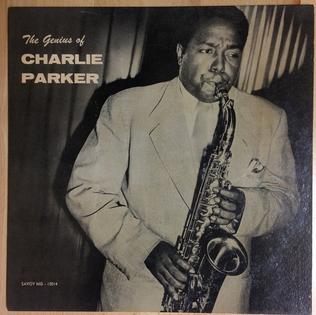
The Genius of Charlie Parker is an LP record by Charlie Parker, released posthumously by Savoy Records. All but one of tracks on this album had been previously released on other formats, but is the first 12-inch release of these master takes. It contains selections from six sessions recorded between 1944 and 1948, and contains a previously unreleased alternate take from one these sessions.
"Chasin' the Bird" is a composition by Charlie Parker. The original version, by Parker's quintet, was recorded on May 8, 1947. It has become a jazz standard.
"Now's the Time" is a composition by Charlie Parker. He led the first recording of it, on November 26, 1945.












